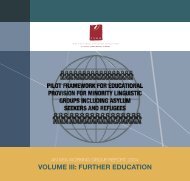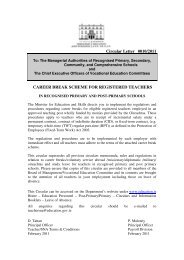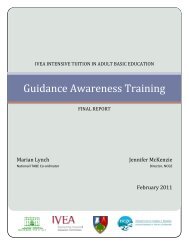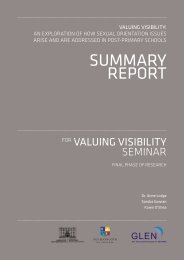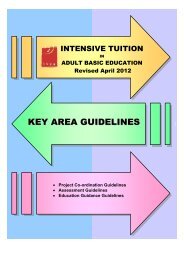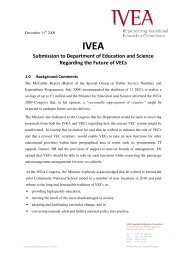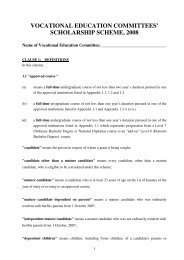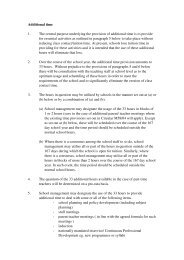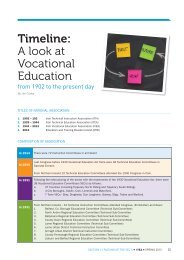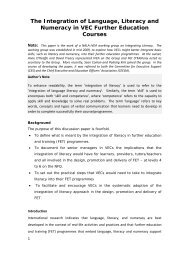ITABE Guidelines 2008 - IVEA
ITABE Guidelines 2008 - IVEA
ITABE Guidelines 2008 - IVEA
You also want an ePaper? Increase the reach of your titles
YUMPU automatically turns print PDFs into web optimized ePapers that Google loves.
Intensive Tuition<br />
in<br />
Adult Basic Education<br />
Project Outline<br />
Local Service Process<br />
This process is subject to local VEC arrangements for project allocation and Co-ordinator recruitment 1 .<br />
1 See Appendix 1 for a sample local service application form.<br />
1
Appoint <strong>ITABE</strong> Local Co-ordinator<br />
a. Recruit and appoint local <strong>ITABE</strong> Co-ordinator as per instructions from DES.<br />
b. There has been an allocation of 21 co-ordination hours per 14 week project.<br />
Recruit Students<br />
c. Commence the process of identifying current students who would benefit from the<br />
<strong>ITABE</strong> project.<br />
d. Agree local timetable based on DES allocation of local projects and guidelines in<br />
relation to session timeframes (2 X 3 hour OR 3 X 2 hour sessions).<br />
e. Commence local recruitment process for new students.<br />
Briefing Sessions<br />
f. Attend briefing sessions<br />
Assessment (Pre-course)<br />
g. Carry out pre-course student skills assessment in line with <strong>ITABE</strong> guidelines.<br />
h. Arrange guidance sessions (where appropriate).<br />
Implement the <strong>ITABE</strong> Programme<br />
i. Commence tuition.<br />
Assessment (Post-course)<br />
j. Carry out post-course assessments and measure progress.<br />
Tuition Programme <strong>Guidelines</strong><br />
In order for this project to be effective a level of flexibility in the design of each local programme must<br />
be maintained to facilitate the needs of the individual student and within the parameters set-down by<br />
the DES. The participant’s current learning activities and those identified through the participation of<br />
the Adult Education Guidance Service should guide the development of each tuition programme.<br />
Aim<br />
1. To provide adults experiencing literacy/numeracy difficulties with an opportunity to access a<br />
minimum of 6 hours tuition per week over the 14 week duration of this project.<br />
2. To acknowledge the need for literacy/numeracy tuition to be provided within the context of<br />
the individual student’s needs and the level of basic skills required to function within the<br />
home, community and workplace.<br />
3. To deliver the tuition programme within appropriate models of good practice.<br />
Expected Outcomes<br />
4. Measurable increase in participant literacy/numeracy levels.<br />
5. Appropriate levels of engagement with the AEGI (where available).<br />
The following guidelines are intended to assist in the design of the local programme and to indicate the<br />
subject parameters of the project. Activities/course content identified under each heading are simply<br />
suggestions from which a course might be developed.<br />
Communication Skills<br />
6. The majority of the 84 tuition hours will be allocated to direct literacy/numeracy provision.<br />
7. The main focus of the <strong>ITABE</strong> local tuition programme should be on a combination of some<br />
or all of the following –<br />
i. Oracy<br />
2
ii. Reading<br />
iii. Writing<br />
iv. Spelling<br />
v. Numeracy<br />
8. Course content may be informed by the learning outcomes identified for the FETAC<br />
Communication Skills Minor Award at a level appropriate to the group.<br />
Learning to Learn<br />
9. The provision of adult educational guidance is an essential element of this project.<br />
10. There are a number of opportunities for local AEGI staff members to enhance the benefits<br />
of this project for students. For examplea.<br />
The Adult Education Guidance Officer (AEGO) might provide a 1:1 guidance opportunity<br />
to participating students prior to engagement with the <strong>ITABE</strong> project to place this new<br />
opportunity within the context of their learning to date and their expressed learning<br />
goals.<br />
b. Guidance service staff might liaise with the local ALO/AEO to agree direct participation<br />
in the Learning to Learn section of the course in areas such as Study Skills.<br />
c. A session/module of the course might take on the form of a workshop for students to<br />
explain adult education guidance.<br />
11. Once again Learning to Learn course content may be informed by the learning outcomes<br />
identified for the FETAC Communication Skills Minor Award at a level appropriate to the<br />
group.<br />
Introduction to IT Skills<br />
12. This element of the <strong>ITABE</strong> tuition programme is intended as an opportunity to introduce<br />
students to the benefits of IT.<br />
13. The Introduction to IT Skills section should focus on computers as a tool to assist the<br />
learner in improving their literacy/numeracy and general learning skills.<br />
14. Course content may be informed by the learning outcomes identified for the FETAC<br />
Communication Skills Minor Award and other IT Minor Awards at a level appropriate to the<br />
group.<br />
Where existing groups are to be enrolled in the <strong>ITABE</strong> programme for the period of the project every<br />
effort should be made to build on work carried out to date and to introduce some or all of the course<br />
elements set out above.<br />
Accreditation<br />
Participants should be given the option of accreditation where available. Where accreditation is<br />
appropriate but is not yet available (e.g. FETAC Levels 1 & 2) the participants should be facilitated to<br />
gather their work in a manner that might later contribute towards accreditation if they so wish.<br />
Assessment<br />
It is a requirement of this project that student skills levels are measured at entry and exit to the <strong>ITABE</strong><br />
programme.<br />
Assessment Process<br />
1. The assessment process should reflect both existing assessment procedures within the<br />
local adult literacy service and the proposed course outcomes in order that the measure of<br />
progress over the duration of the project can be meaningful.<br />
2. To facilitate a quantitative and qualitative evaluation of the project it is necessary that a<br />
standard assessment tool be used for each local project (See <strong>ITABE</strong> Assessment Pack)<br />
3
Initial Assessment<br />
3. There is a possibility that where students participating in this project are currently enrolled in<br />
the local adult literacy service that their most recent skills assessment may provide some if<br />
not all of the information required.<br />
End-of-course Assessment<br />
4. The end of course assessment should be carried out immediately after the end of the 14<br />
week tuition period.<br />
Briefing Sessions<br />
It is proposed to deliver regional briefing sessions in a number of key locations 2 .<br />
Purpose<br />
The main outcomes of the regional briefing sessions are as follows-<br />
1. To familiarise relevant VEC staff with the project aims and structure.<br />
2. To ensure a level of national uniformity.<br />
3. To offer an opportunity to exchange information, ideas and expertise.<br />
Structure<br />
It is envisaged that each Briefing Session will be of 3 hours duration-<br />
10.00 Registration Tea / Coffee<br />
10.30 Welcome and Introductions<br />
10.45 Overview of Intensive Tuition in Adult Basic Education (<strong>ITABE</strong>) project<br />
11.15 Guide to curriculum and materials<br />
11.40 Assessment and assessment guide, accreditation.<br />
12.00 Participant reflection on project: groupwork, feedback and discussion<br />
1.00 Review, next steps and event evaluation<br />
1.30 Close<br />
Monitoring & Support<br />
National Monitoring & Support<br />
1. Overall monitoring and support of the project will be provided by the National Advisory<br />
Group.<br />
2. Monitoring the implementation of the national project will be carried out by the <strong>ITABE</strong> Coordinator<br />
in liaison with a contact person nominated by each VEC.<br />
3. Support will be provided nationally by telephone and website by the <strong>ITABE</strong> Co-ordinator.<br />
Local Monitoring & Support<br />
4. Local monitoring and support will be provided by the local <strong>ITABE</strong> Co-ordinator as<br />
appropriate and within the individual VEC’s management structures.<br />
2 See Appendix 3 for a map of the proposed regions and the locations for each briefing session.<br />
4
Appendix 2 - <strong>ITABE</strong> Project Basic Information<br />
What is the <strong>ITABE</strong> Project<br />
The Intensive Tuition in Adult Basic Education (<strong>ITABE</strong>) project is an initiative of the Department of<br />
Education & Science to provide intensive tuition in adult literacy and basic education for adults who are<br />
educationally disadvantaged. The aim of the programme is to provide participants, in groups of 6 – 8<br />
students, with an opportunity to access 6 hours of tuition per week over a 14 week period as opposed<br />
to the average of 2 hours per week currently provided.<br />
A number of these projects have been allocated to each of the 33 VECs.<br />
This is a joint project led by the <strong>IVEA</strong>, in partnership with NALA, with the co-ordination of the project<br />
provided by County Dublin VEC.<br />
The <strong>ITABE</strong> project will be supported by an Advisory Group comprising representatives of the<br />
Department of Education & Science, The Irish Vocational Education Association, The VEC Literacy<br />
Forum, The National Adult Literacy Agency and the National Centre for Guidance in Education.<br />
Who are the course participants<br />
Participants will be 18 years of age or older and not attending full-time second level education. They<br />
must be experiencing a severe degree of literacy or numeracy difficulties and have a literacy standard<br />
below FETAC Level 3.<br />
What might the course content include<br />
The majority of tuition hours will be allocated to modules most directly related to literacy/numeracy<br />
provision. The course content should include a combination of the following-<br />
• Communication Skills: Oracy / Reading / Writing /Spelling /Numeracy<br />
• Learning to Learn: Understanding Learning Styles / Study Skills / Educational Guidance<br />
• Introduction to IT: Basic Computers / Internet<br />
Will there be an option of accreditation<br />
Participants will be given the opportunity to gain FETAC accreditation if they so choose and if it is<br />
available. All participants must have their literacy/numeracy skills assessed at the beginning and end of<br />
the course using appropriate methodologies.<br />
What additional supports are available to participants<br />
Adult students taking part in <strong>ITABE</strong> programmes are entitled to access the Adult Education Guidance<br />
Initiative in schemes in which guidance projects have been established.<br />
Since <strong>ITABE</strong> projects will be provided by local VEC Adult Literacy Services participants will also benefit<br />
from the existing supports provided by these services.<br />
Appendix 3 - <strong>ITABE</strong> Implementation Summary<br />
The key details are summarised below –<br />
• Participants must be 18 years of age or older and not attending full-time second level education.<br />
• They must have skills lower than FETAC Level 3.<br />
• An appropriate assessment must be carried out upon entry into the 14 week programme and<br />
after the programme is completed.<br />
5
• The majority of tuition hours must be allocated to literacy/numeracy.<br />
• Curriculum areas are: Communications (incl. Numeracy), Learning-to-Learn and Introduction to<br />
IT.<br />
• Each group must comprise of 6 - 8 participants.<br />
• Each project has an allocation of 84 tuition hours to be paid at a rate of €46.20 per hour<br />
(including all employer costs = €3,881.00 per project.<br />
• Tuition will be delivered at a rate of 6 hours per week over 14 weeks ( either 2 by 3 hour<br />
sessions OR 3 by 2 hour sessions)<br />
• Local co-ordination costs amounting to 21 hours per project should be paid at the same rate as<br />
tuition - €46.20 per hour (inclusive). This is equivalent to 25% of tuition at a total cost of €970.00<br />
per project.<br />
• In addition there is a materials/overheads allocation of €1,200.00 per project.<br />
• Therefore the total funding per local project amounts to €6051<br />
For further information contact:<br />
Marian Lynch<br />
National <strong>ITABE</strong> Co-ordinator<br />
County Dublin VEC<br />
I Tuansgate<br />
Belgard Square East<br />
Tallaght<br />
Dublin 24<br />
Tel: 01 4529600<br />
Email m.lynch@codubvec.ie<br />
6



